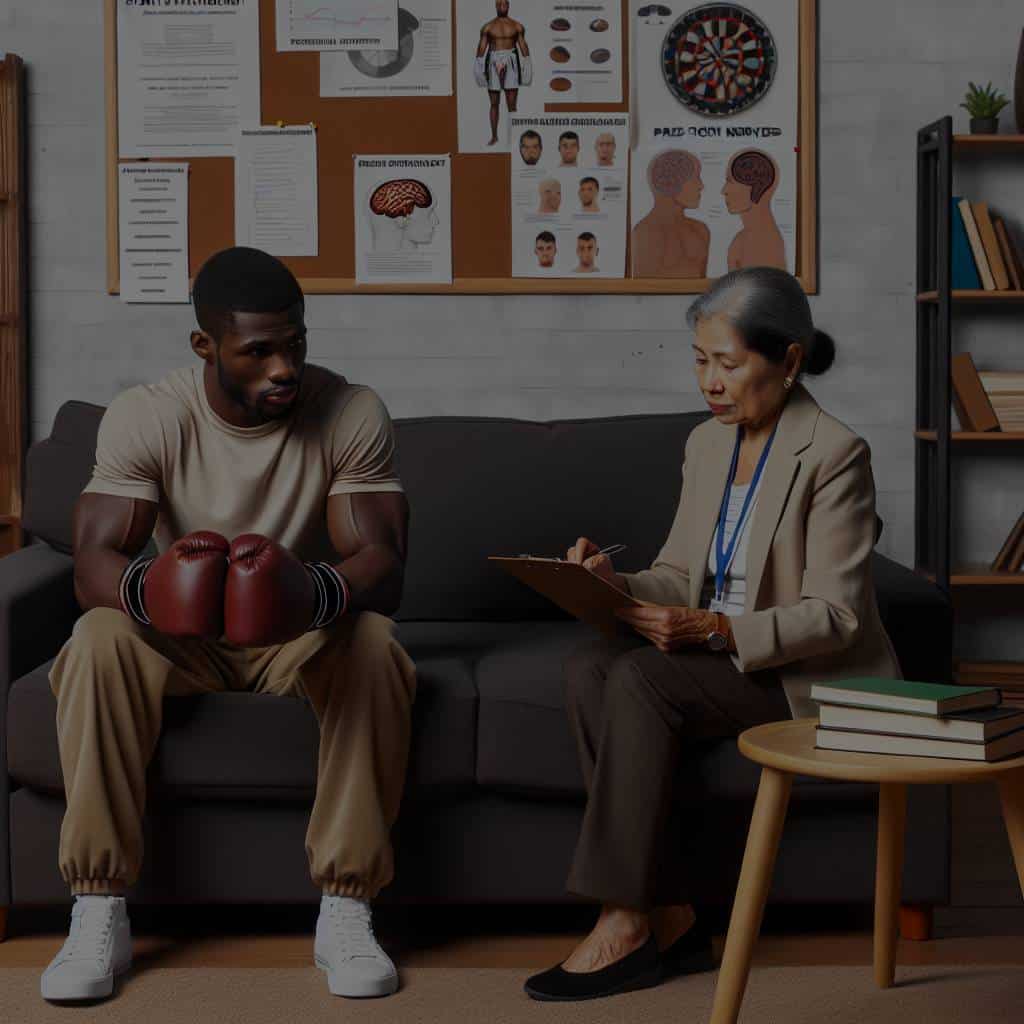Which Psychological Techniques Can Help Boxers Cope with Pre-Fight Nerves?

Boxing, like any other sport, requires not only physical strength and agility but also a strong mental game. The pressure of the upcoming fight, the fear of injury, the anxiety over performance, and the stress of public scrutiny can all take a toll on a fighter’s mental health. This article delves deep into the subject of pre-fight nerves and the psychological techniques that can help boxers overcome them. We’ll explore how mental training, visualization, sports psychology, and other strategies can help athletes manage their anxiety, increase their confidence and improve their focus on the big day.
Mental Training For Athletes
Mental training is just as crucial as physical training for athletes, especially for boxers who have to stand in the ring alone and face an opponent. This section explores how mental training can help boxers handle pre-fight nerves and enhance their performance.
Also to discover : What Are the Best Core Strengthening Exercises for Competitive Horse Riders?
Mental training involves various techniques, including relaxation exercises, cognitive restructuring, and self-talk. These methods aim to reduce anxiety, improve focus, and build confidence. Relaxation exercises such as deep breathing and progressive muscle relaxation can help boxers combat stress and maintain calm before a fight. Cognitive restructuring involves changing negative or dysfunctional thought patterns into positive ones. This technique can help boxers overcome self-doubt and foster a positive attitude towards their upcoming fight. Self-talk is another powerful tool in mental training. Positive self-talk can boost confidence and improve performance under pressure.
Moreover, mental training can also help boxers develop resilience. Resilience is the ability to bounce back from adversity, which is a vital quality for a boxer. Through mental training, boxers can learn to cope with setbacks and keep their focus on their goals, which is crucial in the high-pressure environment of a boxing match.
Also read : What’s the Impact of Music Tempo on Warm-Up Efficiency in Gymnasts?
Sports Psychology and Anxiety
Sports psychology can offer helpful tools to fight against pre-fight nerves. Let’s explore how sports psychology can assist boxers in managing their anxiety and boosting their performance.
Athletes often experience a range of emotions before a competition, including excitement, fear, and anxiety. These emotions can affect their performance if not properly managed. Sports psychology can offer boxers strategies to understand and manage their emotions better.
One main strategy in sports psychology is the use of goal setting. Setting specific, measurable, achievable, relevant, and time-bound (SMART) goals can provide a clear focus for boxers and reduce their anxiety. Knowing what they want to achieve and having a plan to get there can help boxers feel more in control, thereby reducing their anxiety.
Moreover, sports psychologists often work on improving boxers’ self-efficacy, the belief in their ability to succeed. High self-efficacy can help boxers manage their anxiety and perform better under pressure. Techniques to improve self-efficacy include mastery experiences (successfully accomplishing tasks), vicarious experiences (seeing others succeed), verbal persuasion (positive feedback), and physiological states (managing physical responses to stress).
Visualization Techniques for Boxers
Visualization is another powerful psychological technique that boxers can use to manage pre-fight nerves. Let’s explore how visualization works and how it can benefit boxers.
Visualization, also known as mental imagery, involves creating mental images of specific scenarios. For boxers, this could mean visualizing themselves in the ring, executing their techniques flawlessly, and winning the match. This mental rehearsal can help boxers improve their skills, boost their confidence, and reduce their anxiety.
Visualization can also help boxers prepare for different scenarios that might occur during a match. For example, they could visualize themselves getting knocked down but then getting back up and continuing the fight. This can help them stay resilient and focused even when faced with challenges.
Moreover, visualization can help boxers manage their emotions. By visualizing themselves staying calm and composed during the fight, they can train themselves to maintain their composure in real-life situations.
How MMA Fighters Handle Anxiety
MMA fighters, like boxers, also face intense pressure and anxiety before a fight. By looking at how they handle these challenges, boxers can gain valuable insights.
One strategy that MMA fighters use to manage pre-fight nerves is focusing on the process rather than the outcome. They concentrate on their training and their techniques rather than worrying about whether they will win or lose. This process-oriented approach can help reduce anxiety and improve performance.
Another strategy is mindfulness, which involves being present in the moment and accepting it without judgment. This technique can help fighters stay focused, reduce their anxiety, and increase their mental toughness.
Lastly, MMA fighters often rely on their support systems, including coaches, teammates, family, and friends, to help them manage their anxiety. These support systems provide encouragement, feedback, and a sense of belonging, which can boost fighters’ confidence and reduce their stress levels.
Muay Thai and the Importance of Mental Toughness
Muay Thai, often referred to as "The Art of Eight Limbs," is a martial art that demands not only physical prowess but also mental toughness. Let’s examine the correlation between this particular combat sport and the mental fortitude it requires.
In Muay Thai, fighters use their fists, elbows, knees, and shins, which is why it’s referred to as the art of eight limbs. A Muay Thai match, like a boxing match, is high-pressure and high-stakes, with fighters facing intense mental and emotional challenges. To prepare for matches, Muay Thai fighters often use mental skills training to develop the mental toughness necessary to handle pre-fight nerves.
Mental toughness in combat sports is all about resilience, focus, confidence, and control. It’s about staying calm in the face of adversity, maintaining concentration despite distractions, believing in one’s abilities, and controlling emotions under pressure. Mental toughness can be developed through various psychological techniques like mental training, sports psychology, visualization, and mindfulness.
For instance, a sport psychologist could teach a Muay Thai fighter relaxation exercises to manage their heart rate and stress levels during a fight. They might also use cognitive restructuring to help fighters replace negative thoughts with positive ones. Visualization can assist fighters in mentally rehearsing different strategies and scenarios, thus improving their performance. Mindfulness can help fighters stay present and focused on the task at hand, rather than worrying about the outcome of the match.
By developing mental toughness, Muay Thai fighters can better handle their pre-fight nerves, enhance their performance in the ring, and ultimately, increase their chances of success.
Conclusion: Managing Pre-Fight Nerves in Mixed Martial Arts (MMA)
In conclusion, managing pre-fight nerves is a crucial aspect of combat sports, be it boxing, Muay Thai, or mixed martial arts (MMA). Mental preparation is just as important as physical training, and various psychological techniques can help fighters develop the mental skills necessary to cope with the stress and anxiety of an upcoming match.
Mental training can help fighters manage their anxiety, boost their confidence, and improve their focus. Sports psychology offers strategies for understanding and managing emotions, setting SMART goals, and improving self-efficacy. Visualization allows fighters to mentally rehearse scenarios and manage their emotions, while techniques like mindfulness and process-oriented focus can help increase mental toughness.
Finally, the support of coaches, teammates, family, and friends can be invaluable in dealing with pre-fight nerves. A good support system can provide encouragement, feedback, and a sense of belonging, all of which can boost confidence and reduce stress.
Whether you’re a boxer preparing for your next match or a martial arts enthusiast trying to improve your mental game, remember that managing pre-fight nerves is a crucial part of sports performance. It’s not just about the fight or flight response but about developing the mental resilience to face any challenge head-on. After all, the most significant battles are often fought in the mind before they’re fought in the ring.
